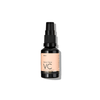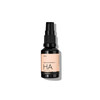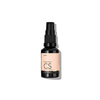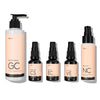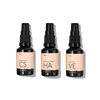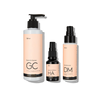Identifying Your Skincare Skin Type
Good skincare is at the heart of any successful health and beauty routine, which is why understanding your skin is an essential ingredient in the recipe for unlocking your best appearance.
While all skin types serve the same fundamental functions, their contrasting attributes can have a big influence on the skincare routine that should be implemented. So, which skin type are you? Let's find out.

Normal Skin
Normal skin can be characterised as supple and soft, fine-pored, elastic, well circulated, and rosy in complexion. Other key attributes include a naturally well-moisturized t-zone and you will notice that you're not prone to breakouts on the cheeks. Imperfections are rare, and you do not suffer from sensitivity.
Individuals blessed with normal skin require far less maintenance than most people. Nonetheless, daily moisturising (ideally with a gel-like material) remains an ongoing requirement, while semi-frequent exfoliation is advised to help maintain optimal skin health and the best appearance.
Dry Skin
Dry skin tends to be dry, rough, and flaky. The skin is also noticeably less elastic while pores are invisible and lines are more noticeable. You may also experience red patches, itching, irritation, and inflammation. Symptoms associated with dry skin can often be seen on the hands, as well as your arms and legs.
When you have dry skin, environmental changes such as wind or sunlight can lead to even greater irritation. If you are an individual who suffers from dry skin, wearing sun lotion is particularly crucial while staying suitably hydrated and using moisturising creams throughout the day will help too.
Blemished Skin
Blemished skin is known to be more sensitive than most, while it also produces more sebum from the sebaceous glands as the majority of other skin types, which gives it a somewhat oily feel. Other distinct attributes include large pores, a natural shiny complexion, and breakouts of blackheads, spots and acne. This is particularly noticeable at times of hormonal changes.
Antibacterial cleaners and skincare can help restore the pH balance of your skin while a weekly face scrub is shown to have a positive impact. Matte day creams are a good choice, but individuals should avoid touching acne as this encourages the blemishes to spread.
Combination Skin
Combination skin is essentially a mixture of normal skin and blemished skin. Normal skin will be seen around the cheeks and chin, although it may show signs of dry skin too. Meanwhile, the T-zone will be blemished and possibly oily. Common characteristics include shiny skin, larger-than-normal pores, and the presence of blackheads.
The fact that combination skin has two distinct (and contrasting) issues happening at once, the skincare routines can be a little tricky. A delicate cleanse of the blemished areas should be followed by moisturising the normal-to-dry areas. However, it is also possible to find products built for your skin type.
Sensitive Skin
While the obvious characteristic of sensitive skin relates to the fact it reacts to environmental influences such as the wind, UV light, or heat, this isn't the only key feature. The skin is also tight, dry, and itchy, particularly when the pH levels are imbalanced. This commonly results in red patches across the cheeks, forehead, and chin.
Sensitive skin can also impact the hands, feet, arms, and legs. Perfume-free products can help reduce the irritation while wearing creams that provide an additional barrier between your skin and harmful rays is vital too. When drying the skin with a towel, dabbing is better than vigorous rubbing.
Oily Skin
Skin becomes oily due to heightened levels of sebum production and is often associated with a shiny and thick complexion that can additionally become visibly dull. Enlarged pores can also make the skin susceptible to blackheads, acne, and other blemishes. The issues become most noticeable when you are stressed, subjected to heat, or experience hormonal changes.
This type of skin is most closely linked to blemished skin and requires a similar skincare routine. When washing the face, use a gentle wash and avoid scrubbing. Noncomedogenic skincare products that will not clog the pores are very useful too.
Mature Skin
The skin naturally changes as we get older. Regardless of what skin type you had during your younger days, mature skin will have reduced elasticity while a lack of moisture can leave it feeling dry. Reduced cell activity, collagen, and cell regeneration can cause wrinkles, lines, and other signs that are regularly attributed to the aging process.
Mature skin needs protection from the sun, while specialised eye creams can be used to combat laughter lines and crow's feet around the eyes. Moisturisers and daily creams built to support cell regeneration, which is often promoted as anti-age creams, are essential additions to skincare routines.
At Fether we know great skin health is imperative for self-confidence and an overall feeling of well being, That is why we have especially formulated our skincare to cater to all skin types.
